AI Customer Service Case Studies Driving Change in 2025
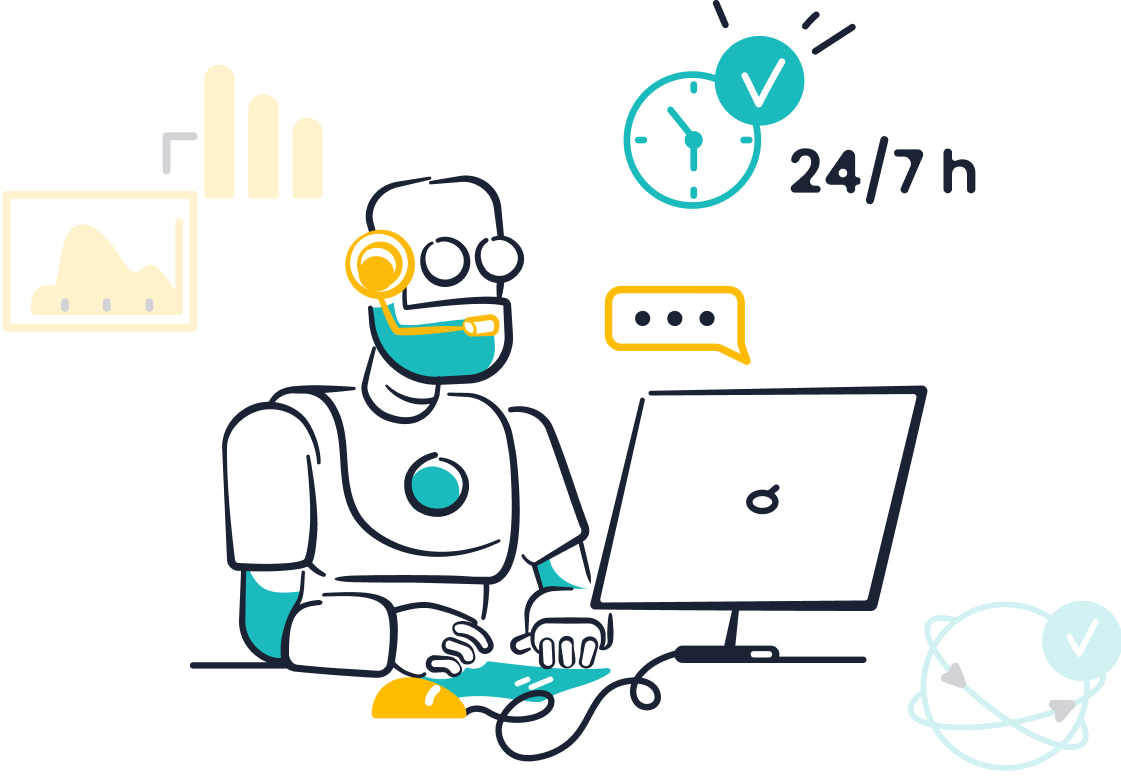
Artificial intelligence is transforming customer service in 2025, creating faster, smarter, and more satisfying experiences for everyone. Companies now see real progress from ai customer service case studies, with measurable improvements in satisfaction and efficiency. The following table shows how artificial intelligence changes results in customer service:
| Metric | Improvement with AI Customer Service Implementation |
|---|---|
| Customer Satisfaction | +45% increase due to continuous availability |
| Processing Time | -77% reduction in request processing time |
| Net Promoter Score (NPS) | +15-25 point improvement |
| First Contact Resolution Rate | +40% improvement |
| Wait Times | -50% reduction |
| Operational Cost Reduction | Up to 30% reduction |
| ROI | 300-400% over 3 years for leading companies |
| Revenue Increase | 7-25% increase by sector |
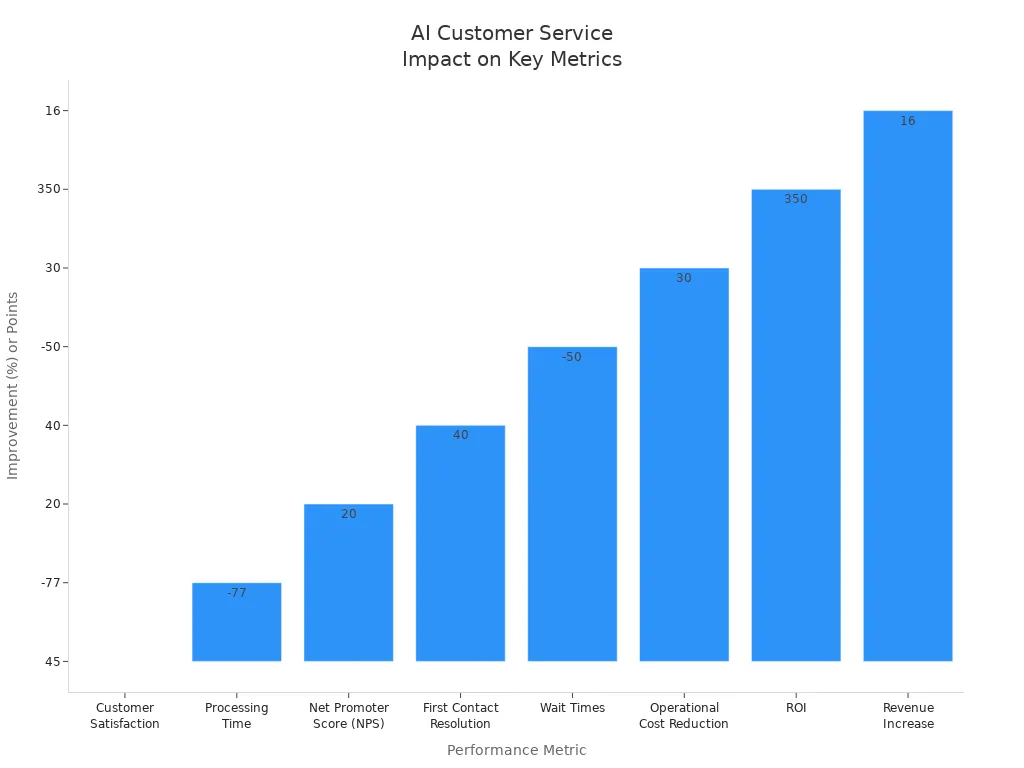
Sobot AI and the Sobot call center help organizations achieve these results by automating support and revolutionizing customer experience. Business leaders now use ai in customer service to cut costs and improve customer experience, with Sobot solutions leading the way in transforming customer service.
AI in Customer Service Trends

Artificial intelligence is changing the way companies deliver customer service in 2025. Businesses now focus on four main ai customer service trends: hyper-personalization, omnichannel integration, proactive support, and emotional intelligence. These trends help companies create a frictionless customer experience and build lasting loyalty.
Hyper-Personalization
Hyper-personalization uses artificial intelligence to analyze large amounts of data and create unique experiences for each customer. AI-powered customer data platforms and autonomous agents study customer interactions and preferences. Companies see up to a 45% increase in engagement and a 25% boost in retention rates by using personalized service. For example, 87% of organizations using AI-driven personalization report better engagement, and 78% of customers want consistent brand experiences across all channels. AI in customer service enables real-time data processing and natural language understanding, making every conversation feel human and empathetic. Sobot’s AI-first customer service platform uses these tools to deliver personalized customer engagement, helping businesses predict customer needs and reduce churn.
Omnichannel Integration
Omnichannel integration connects all customer service channels, so customers get seamless customer interactions no matter where they reach out. AI in customer service platforms like Sobot unify chat, email, voice, and social media, making it easy for agents to provide consistent support. Companies using omnichannel AI see big improvements:
| Metric | Improvement | Example |
|---|---|---|
| Increase in Sales | 25% | Sephora’s AI-driven promotions |
| Reduction in Wait Times | 30% | Bank of America’s AI routing |
| Customer Lifetime Value (CLV) | Up to 20% | Verizon’s personalized plans |
| Reduction in Churn | Up to 15% | Amazon’s seamless experiences |
| Operational Cost Savings | Up to 25% | AI automation by Plivo and Nice CXone |
| Customer Retention Rate Increase | Up to 30% | Projected benefits of omnichannel AI integration |
| Revenue Growth | 9.5% | Accenture research |
| Customer Satisfaction Increase | Up to 25% | Salesforce study |
| Customer Loyalty Increase | 30% | InMoment research |
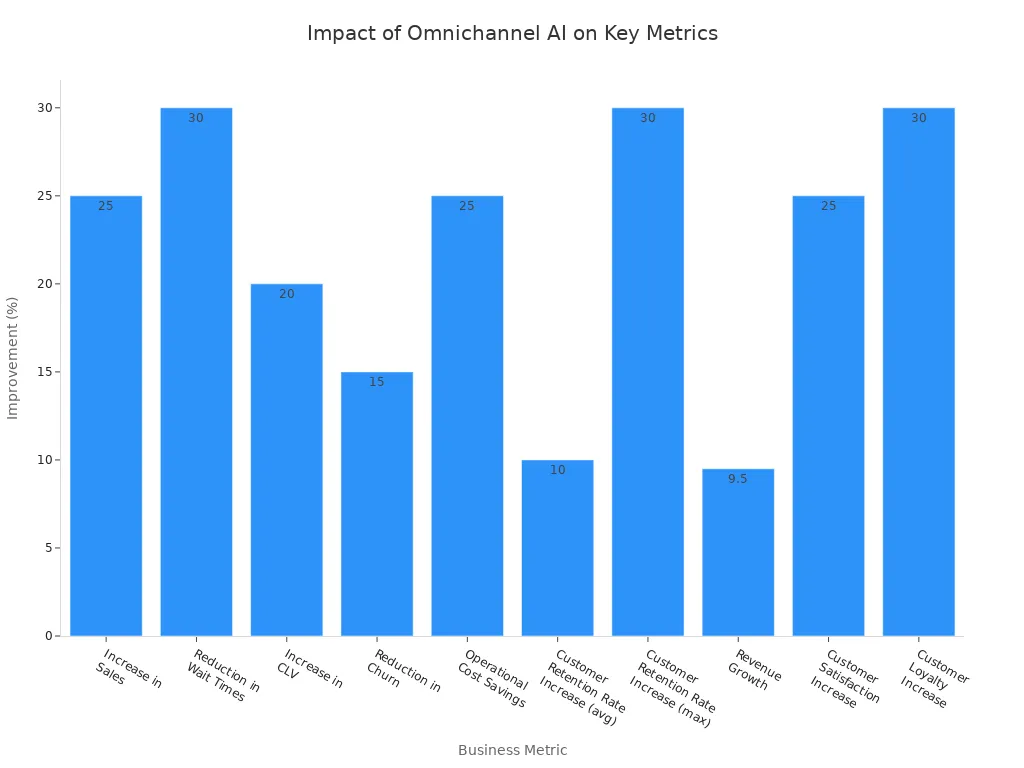
Sobot’s AI-first customer service solutions help companies achieve these results by automating workflows and providing unified customer data. This approach leads to faster response times, higher satisfaction, and lower costs.
Proactive Support
Proactive customer care means using artificial intelligence to solve problems before customers even notice them. AI in customer service predicts customer needs by analyzing behavior and feedback. For example, AI chatbots can spot when a customer might have trouble and offer help right away. Automated follow-ups and personalized messages make customers feel valued. Companies using proactive support see lower churn and higher loyalty. For instance, Wyze Labs achieved an 88% self-resolution rate, and Akool reduced churn by 26.4% with AI-powered interventions. Sobot’s AI-first customer service platform uses predictive analytics and real-time engagement to deliver proactive support, turning potential problems into positive experiences.
Note: Emotional intelligence in AI helps agents understand customer feelings, respond with empathy, and build trust. AI-powered sentiment analysis and real-time coaching improve communication and reduce agent stress. Companies using emotional AI report up to a 30% increase in customer satisfaction and loyalty.
These ai customer service trends show how artificial intelligence and AI-first customer service platforms like Sobot transform customer support. Businesses now deliver personalized service, seamless customer interactions, and proactive care, creating a better customer experience for everyone.
Sobot AI Customer Service Case Studies
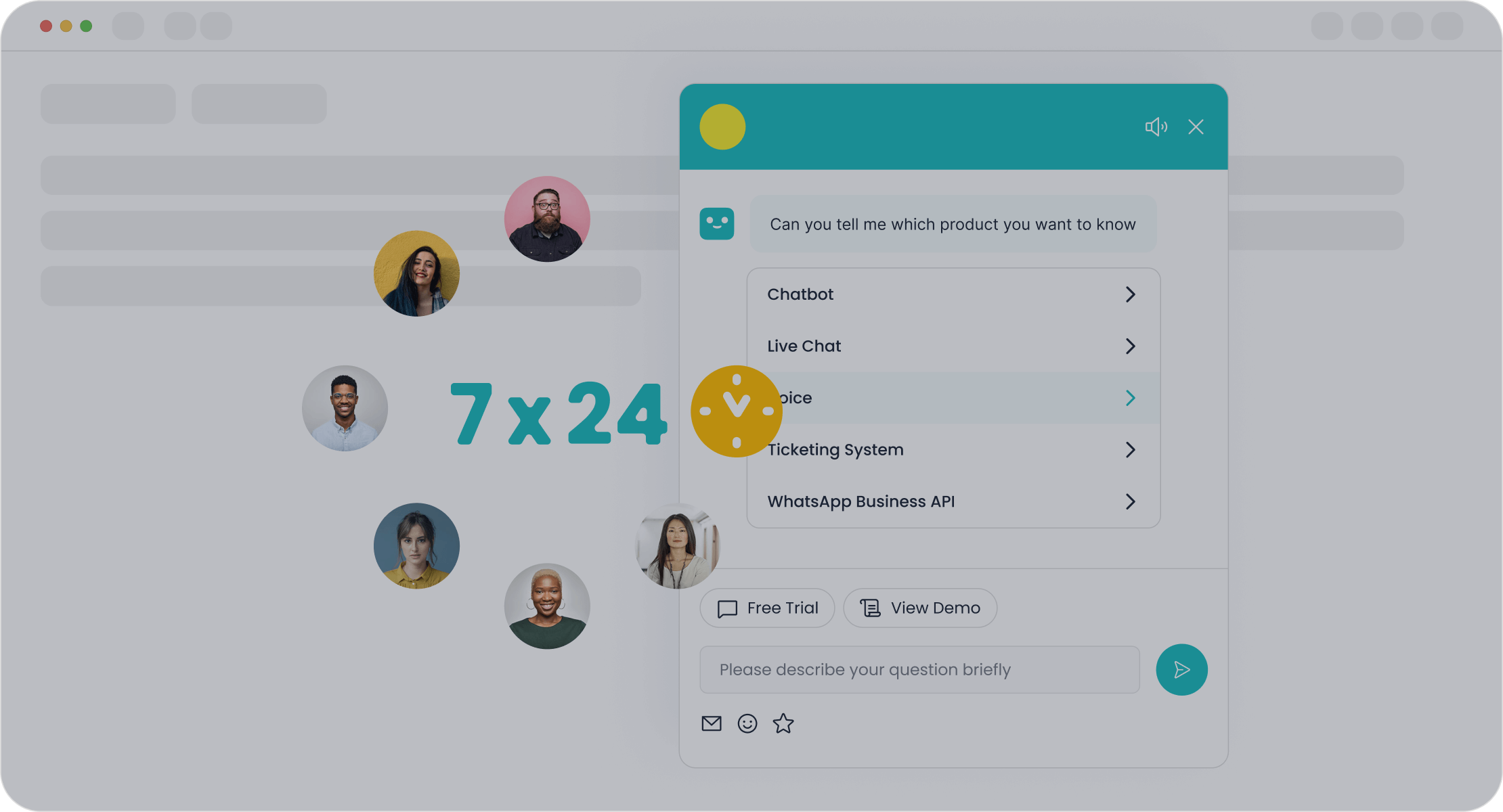
OPPO Success Story
OPPO, a global leader in smart devices, faced challenges with high volumes of customer inquiries, especially during shopping festivals. The company needed a solution to manage repetitive questions, reduce agent workload, and improve customer satisfaction. Sobot provided OPPO with an advanced chatbot and ticketing system. These tools automated responses to common questions and allowed human agents to focus on complex issues.
The results show the power of ai customer service case studies. OPPO achieved an 83% chatbot resolution rate, meaning the chatbot solved most customer requests without human help. The company also saw a 57% boost in repurchase rates, showing that better service leads to more loyal customers. Positive feedback reached 94%, reflecting high customer satisfaction.
| Measurable Outcome | Reported Value |
|---|---|
| Chatbot resolution rate | 83% |
| Repurchase rate boost | 57% |
| Positive feedback score | 94% |
Sobot’s ai-powered customer service helped OPPO overcome disconnected support channels and high operational costs. The system unified customer data and automated support across multiple channels. OPPO improved customer retention and increased sales by personalizing interactions and automating the shopper journey. Sobot’s ai-first customer service platform enabled OPPO to respond quickly, provide personalized service, and reduce manual work by 90% in knowledge base maintenance.
Sobot’s solutions also improved Net Promoter Score by over 35% through targeted promotions and increased conversion rates by over 15%. These results highlight how ai in customer service can drive business growth and customer loyalty.
OPPO’s experience shows that artificial intelligence can transform customer service operations. Companies can achieve measurable improvements in customer satisfaction, retention, and sales by using ai chatbots and unified support systems.
Retail & E-Commerce Solutions
Retail and e-commerce companies face unique challenges. They must handle large numbers of customer interactions, especially during peak seasons. Sobot’s ai-powered customer support provides a solution that automates routine tasks and delivers 24/7 service. This approach reduces operational costs and improves customer satisfaction.
Companies using Sobot’s ai-first customer service platform report:
- A 50% reduction in total resolution time through automation.
- Initial response times improve by 37%, allowing faster engagement.
- 80% of customers express satisfaction with prompt AI-powered interactions.
- Staffing needs drop by 68% during busy periods, lowering costs.
- Cart abandonment rates fall by 20-30% due to proactive support.
- Customers who interact with high-intent chatbot messages are five times more likely to convert.
Sobot’s omnichannel support connects chat, email, voice, and social media. This integration ensures customers receive consistent service wherever they reach out. AI chatbots handle routine questions, freeing agents to solve complex problems. Companies see a 25% increase in customer satisfaction and a 30% increase in sales. These improvements lead to higher customer retention and business growth.
Omnichannel support and automation also reduce operational costs by up to 30%. AI-powered chatbots provide personalized service at any time of day. Retailers can focus human agents on complex issues, improving workforce management and customer experience. By 2025, AI is expected to handle 95% of customer interactions in retail and e-commerce.
Sobot’s ai customer service case studies show that automation and omnichannel support drive both cost savings and better customer experiences. Retailers using Sobot’s solutions gain a competitive edge through faster service, higher satisfaction, and improved retention.
Chatbot Impact
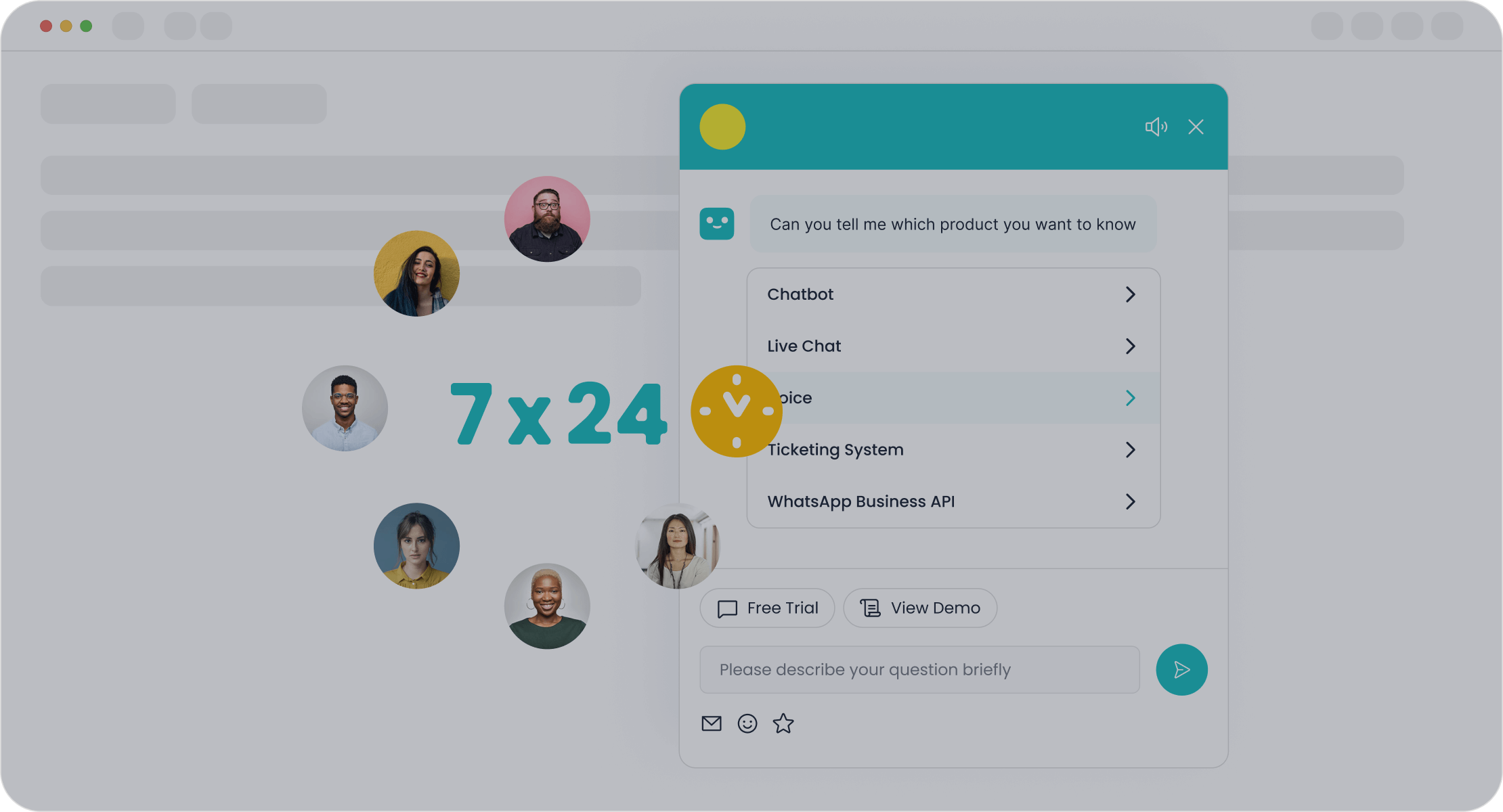
AI chatbots have changed the way companies deliver customer support. Sobot’s ai-powered customer service tools help businesses respond quickly, solve problems, and keep customers happy. The impact of ai chatbots appears in many key metrics.
- Domino’s Pizza reduced resolution times by 25% after using an AI-powered chatbot, leading to higher satisfaction and sales.
- Companies using ai chatbots report up to 40% increases in conversion rates.
- A Forrester study found a 30% reduction in handoff rates from chatbots to human agents.
- One e-commerce client saw a 25% increase in conversion rates after deploying Sobot’s chatbot.
- A financial services company cut customer support costs by 30% through chatbot automation.
- Gartner reports that 24/7 chatbot support can lead to a 20-30% increase in sales conversions.
- HubSpot found that responding to customer queries within five minutes can increase conversion rates by up to 22%.
- IBM reports that 40% of customers prefer chatbots over human support for simple issues.
- Companies using advanced ai chatbots report 20-25% cost savings in customer support operations.
Sobot’s ai chatbots handle up to 80% of routine inquiries, reducing response times by 30% and increasing resolution rates by 25%. This efficiency leads to a 25% increase in customer satisfaction and a 20% increase in customer retention. Millennials and Gen Z prefer AI for simple issues, while older generations prefer human agents for complex problems. A hybrid approach, combining ai chatbots and human agents, maximizes overall satisfaction.
| Metric/Aspect | AI-Powered Chatbots (Sobot) | Traditional Human Agents | Notes/Impact on Customer Satisfaction |
|---|---|---|---|
| Customer Satisfaction Increase | 25% increase | N/A | AI chatbots improve satisfaction by faster response and resolution |
| Customer Retention Increase | 20% increase | N/A | Higher retention linked to AI efficiency |
| Response Time Reduction | 30% reduction | N/A | Faster responses reduce abandonment (60% abandon if wait too long) |
| Resolution Rate Increase | 25% increase | N/A | AI handles routine issues quickly, improving resolution rates |
| First-Contact Resolution Speed | 52% faster ticket resolution with AI | Slower compared to AI | AI excels in simple issues, freeing humans for complex ones |
| Handling of Routine Inquiries | Up to 80% handled by AI | N/A | Frees human agents for complex/emotional issues |
| Customer Preference by Demographics | Millennials & Gen Z prefer AI for simple issues (55-60%) | Baby Boomers & Gen X prefer humans for complex issues (55-60%) | Indicates hybrid approach needed |
| Empathy and Complex Issue Handling | Limited empathy, escalates complex cases | Preferred for emotional, sensitive issues | Human agents critical for complex, emotional support |
| Hybrid Approach Effectiveness | Combines AI efficiency with human empathy | N/A | Maximizes overall customer satisfaction |
Sobot’s ai-first customer service platform stands out in ai customer service case studies. Companies using Sobot report a 40% reduction in support tickets and a 30% increase in customer satisfaction. These results align with industry benchmarks and show the growing impact of ai in customer service.
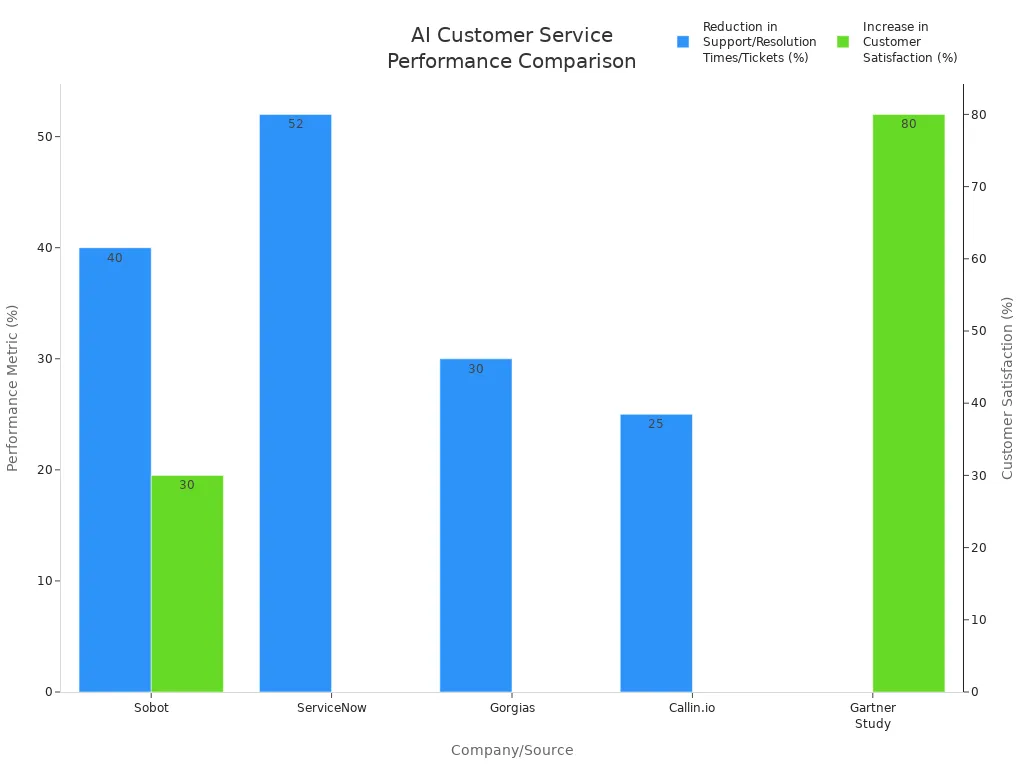
Sobot’s ai-powered customer service solutions also outperform many other platforms by offering advanced automation, 24/7 chatbot support, and scalable tools for real-time engagement. Features like emotional recognition and AI-driven recommendations contribute to a 30% increase in customer loyalty. Companies that focus on customer experience see a 10-15% revenue increase and a 20-30% decrease in costs.
Sobot’s ai chatbots and virtual assistants help businesses deliver fast, personalized service and support. This approach leads to higher customer satisfaction, better retention, and strong business growth.
Sobot’s ai customer service case studies prove that artificial intelligence and ai-first customer service platforms can transform customer support. Companies achieve measurable gains in customer satisfaction, retention, and operational efficiency. As more businesses adopt ai in customer service, the benefits will continue to grow.
Transforming Customer Service Operations
Automation & Efficiency
AI-powered automation is transforming customer service by handling routine tasks and streamlining workflows. Sobot’s AI chatbots manage common inquiries, case handling, and data entry, which reduces manual workload for agents. This automation allows companies to resolve customer requests 52% faster and cut operational costs by up to 30%. AI-powered automation also supports 24/7 customer service, so customers receive help any time they need it. Businesses can scale their support without hiring more staff, making it easier to handle busy periods. Sobot’s platform uses natural language processing and machine learning to deliver accurate, real-time support. As a result, customer satisfaction rises because customers get quick answers and consistent service.
Tip: Companies that invest in AI-powered automation see higher ROI and improved customer satisfaction, according to a McKinsey survey.
Agent Assistance
AI chatbots and real-time AI assistance help agents work more efficiently. Sobot’s tools provide agents with response suggestions and automate ticket routing, which reduces average handling time by 9%. Agents can focus on complex customer needs while AI chatbots handle repetitive questions. Studies show that support teams using AI tools resolve 14% more customer issues per hour. Less experienced agents benefit the most, reaching higher productivity levels quickly. The ai-powered support team at Sobot ensures that both new and seasoned agents deliver high-quality customer service. This approach boosts agent job satisfaction and keeps service quality high.
Data-Driven Insights
AI-powered automation generates valuable data that helps managers make better decisions. Sobot’s platform analyzes customer interactions to uncover trends, predict issues, and personalize service. Predictive analytics optimize staffing and call routing, reducing wait times and improving service quality. AI tools process large amounts of data in real time, so companies can adjust their strategies quickly. Data-driven insights also help identify gaps in service and highlight opportunities for improvement. By using these insights, businesses can increase customer satisfaction and retention. Sobot’s AI solutions enable organizations to build a scalable, future-proof customer service model.
Artificial Intelligence Best Practices
Implementation Steps
Organizations can follow a clear path to deploy AI in customer service. Sobot recommends these steps for building a strong customer service model:
- Assess the current customer engagement landscape. Review all channels, customer journeys, and pain points.
- Define business objectives and set measurable KPIs. Goals might include higher personalization rates or faster resolution times.
- Select the right channels and use cases for AI. Focus on high-touchpoint areas like live chat, email, or social media.
- Leverage AI technologies such as chatbots, voice assistants, and predictive analytics. These tools help personalize and automate customer interactions.
- Use AI-powered platforms like Sobot to centralize data and enable seamless communication across channels.
- Track and analyze performance. Use data to refine AI strategies and improve customer experience.
Tip: Start with a pilot project, then expand as your team gains confidence and expertise.
Compliance & Security
Security and compliance are critical when using AI in customer service. Companies must protect customer data and follow regulations. Best practices include:
- Secure all AI applications with regular code reviews and vulnerability checks.
- Embed ethical principles and safety into AI development.
- Control user access to sensitive data and systems.
- Protect AI models from attacks and unauthorized use.
- Anonymize data and comply with privacy laws like GDPR and HIPAA.
- Encrypt data at rest and in transit.
- Monitor AI systems for unusual activity and keep detailed logs.
- Ensure compliance with regulations through regular audits and documentation.
- Secure third-party components and network infrastructure.
- Prepare for incidents with a clear response plan.
Sobot’s platform supports GDPR compliance and uses encryption to keep customer information safe. Ongoing training helps teams stay updated on security and privacy requirements.
Continuous Optimization
Continuous optimization keeps AI customer service solutions effective over time. Companies monitor key metrics like automation rate, resolution time, and customer satisfaction. They use frameworks that combine operational, customer experience, and financial data to measure impact.
| Aspect | Description & Example |
|---|---|
| Continuous Monitoring | Track automation, escalation, and accuracy rates to find ways to improve. |
| Performance Measurement | Use customer satisfaction and NPS scores to validate AI’s effect on service quality. |
| Phased Implementation | Roll out AI in stages, starting with pilots and expanding as results improve. |
| Training & Change Mgmt | Offer ongoing training so agents can work well with AI tools. |
| AI-Powered Analytics | Use sentiment analysis and predictive models to spot issues before they grow. |
For example, a telecom provider improved chatbot automation from 34% to 67%, saving $450,000 each year. An e-commerce retailer increased conversion rates by 42% using real-time analytics. Sobot’s AI solutions help businesses adapt quickly, ensuring their customer service model stays strong and effective.
Lessons from AI Customer Service Case Studies
Key Takeaways
Sobot’s ai customer service case studies reveal several important lessons for organizations aiming to improve customer service.
- Sobot’s AI automation speeds up ticket resolution by up to 90% and reduces service costs by 30%. This shows that automation can drive efficiency and save money.
- AI chatbots handle complex queries, which lowers wait times and reduces manual work for agents. This leads to better service quality and higher customer retention.
- Real-time analytics help companies optimize processes and deliver proactive support. Businesses can anticipate customer needs and solve problems before they grow.
- AI-driven strategies improve customer satisfaction and build stronger relationships.
- Successful companies focus on automation, integrate AI with CRM systems, and monitor AI performance to meet changing customer demands.
- The best results come from combining efficiency, personalization, scalability, and continuous improvement in customer service.
Note: Companies that use Sobot’s AI solutions often see higher customer retention and long-term customer satisfaction, which supports business growth.
Actionable Recommendations
Business leaders can apply these lessons to their own organizations by taking several steps:
- Deploy AI-powered chatbots to provide 24/7 customer service. This reduces wait times and improves accessibility for customers.
- Use generative AI to personalize engagement and tailor recommendations for each customer.
- Leverage AI-driven analytics to gain insights, identify pain points, and make data-driven decisions.
- Automate routine tasks so human agents can focus on complex issues, improving both efficiency and customer retention.
- Employ AI for proactive problem-solving, detecting and addressing issues before they escalate.
- Pair human agents with virtual assistants to increase the number of chats handled and save on staffing costs.
For example, an electronics retailer used a generative AI chatbot with Shopify to personalize product discovery. This led to an 80% customer satisfaction score and higher order values. Another company improved order processing speed by 30% and increased customer satisfaction by 20% after automating with AI. These examples show that AI can streamline operations, boost customer retention, and support long-term customer satisfaction.
Sobot’s AI customer service case studies show a major shift in customer service for 2025. Companies now use AI to handle 95% of customer service interactions, leading to faster responses and lower costs. Key improvements include a 68% drop in staffing needs during busy times, 52% faster ticket resolution, and higher customer satisfaction.
- Sobot’s tools give 24/7 support, automate routine tasks, and help agents focus on complex customer service issues.
- Visual AI features, like real-time video help, make technical support quicker and more accurate.
Businesses should start with AI chatbots, use predictive analytics, and keep improving their customer service with new AI features. The future will bring even smarter, more personal customer service as AI grows.
FAQ
What are the main benefits of using AI in customer service?
AI in customer service improves response speed, reduces costs, and increases customer satisfaction. Sobot’s ai-first customer service platform helps companies automate 80% of routine tasks. Businesses see up to a 45% increase in satisfaction and a 30% drop in operational costs.
How do ai customer service case studies show real business impact?
Ai customer service case studies highlight measurable results. For example, OPPO used Sobot’s chatbot to reach an 83% resolution rate and a 57% boost in repurchase rates. These stories prove that ai-first customer service platforms drive growth and loyalty.
Can Sobot’s AI handle multiple languages and channels?
Yes. Sobot’s ai-first customer service platform supports over 30 languages and connects chat, email, voice, and social media. This omnichannel approach ensures customers get help anytime, anywhere. Companies using Sobot report a 25% increase in customer satisfaction.
How does AI help agents in customer service?
AI in customer service gives agents real-time suggestions and automates ticket routing. Sobot’s tools help agents resolve 14% more issues per hour. This support lets agents focus on complex problems, improving both efficiency and customer experience.
What steps should a business take to start with ai-first customer service platforms?
Tip: Start with a pilot project.
- Assess current support channels.
- Set clear goals.
- Deploy Sobot’s AI chatbot for routine queries.
- Monitor results and optimize.
Ai customer service case studies show that this approach leads to faster responses and higher satisfaction.
See Also
How AI-Powered Agents Are Transforming Customer Support
Discover The Leading Cloud Contact Centers For 2025
Best Ten Voice Of Customer Tools To Use In 2024
Effective Strategies For Managing Call Center Quality
Comprehensive Reviews Of Leading Contact Center Solutions 2024
